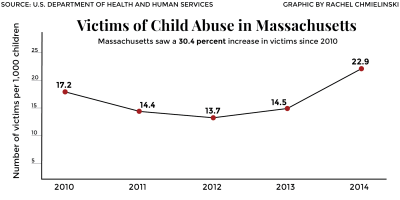
According to an annual report released last week by the U.S. Department of Health and Human Services, Massachusetts was found to have the highest number of reported child abuse cases in Fiscal Year 2014.
Andrea Grossman, a spokesperson for the Massachusetts Department of Children and Families, said in a statement that the DCF has been in the process of redeveloping its intake policy over the past several months.
“In recent months, DCF, working in collaboration with SEIU Local 509 representing the front line social workers and supervisors, has updated its intake policy, to ensure clear direction and expectation for screening and responding to reports of abuse and neglect and created a supervision policy to increase management oversight, both of which are in the process of being implemented,” Grossman said in an email statement.
In an email, DCF officials provided information that FY14 was a year of heightened public awareness that led to higher numbers of child abuse reports in the commonwealth.
“During a period of crisis, it is common that a child welfare agency experiences significant increases in allegations of abuse neglect and responses to those reports, reflecting the heightened state of public awareness,” the email detailed. “The report also reflects a time where the Department began paying heightened attention to reports involving children under six where specific clinical indicators were present, including domestic violence, mental health, and substance abuse.”
DCF officials stated in the email that compared to other states, Massachusetts requires significantly less evidence to start an investigation in child abuse and neglect.
Thomas King, the executive director for Massachusetts Children’s Alliance, said he agrees that the report findings are a reflection of greater awareness in the commonwealth.
“When you have communities that are aware of how to file abuse, you’re going to have more investigations and, likely, more open cases,” King said. “I see that as, ironically, a sign that there has been some good publicity on what citizens should do when they suspect abuse or mandated reporters when they have to file reports.”
King also said media attention given to child abuse and neglect victims spreads awareness among Massachusetts citizens.
“There have been some really provocative headlines with some high profile cases,” King said. “That often will result in more attention to children and higher filings with the Department of Children and Families.”
King said reforms within the DCF have made him optimistic for change in the coming months.
“That’s actually really quite encouraging for all of us doing this work and hoping to make sure that children are handled properly through the department,” King said. “We’re very, very encouraged by the changes that are underfoot under the governor’s leadership as well as the secretary and the commissioner, Linda Spears.”
Several Boston residents said they thought the Department of Children and Families was a worthy priority and should receive more funding in coming years.
Atia Perreira, 25, of Dorchester, said it’s important to prioritize the DCF in order to decrease child abuse cases in the commonwealth.
“I think it’s an important priority because there are a lot of kids in homes who are being abused and sometimes they speak out or sometimes their teachers or other adults notice, but sometimes it’s just brushed under the rug,” she said. “It’s good to prioritize the department and those investigations so that those kids can get help.”
Laila Hlass, 36, of Jamaica Plain, said while she agrees the DCF needs more funding, she hopes they will make good decisions about how specifically to use the resources.
“I think the most important thing is how they decide to utilize the resources, so that they can ensure welfare for children and the ultimate goals of family reunification,” she said.
Morgan Williams, 36, of Jamaica Plain, said he agrees that it’s important for the DCF to utilize the extra resources correctly.
“It seems like a really important issue,” he said. “In general, a good way to deal with issues involves dedicating resources, but again, we don’t have the exact breakdown in front of us. So it depends on how they use the resources.”
Kennedy serves as a city associate for the Daily Free Press. A freshman, she studies English with a minor in philosophy. As a journalist, Kennedy shows special interest in crime and local politics. You can follow her on Twitter at @stellarkenn.














